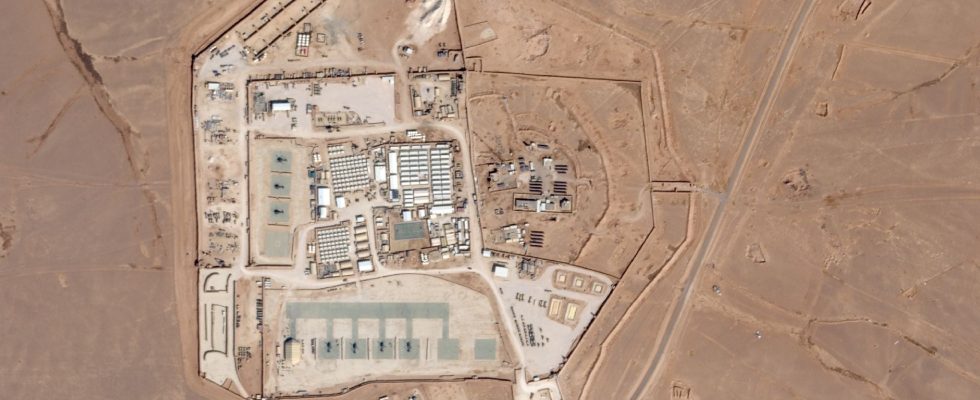This is the first deadly attack against American soldiers since the start of the war between Hamas and Israel on October 7, and it could have destabilizing consequences in a region hit by a latent conflict with Iran. On Sunday January 28, three American soldiers were killed and at least 34 others injured in a drone attack on the American base Tower 22, in the northeast of Jordan, near the Syrian border.
US President Joe Biden, who vowed to retaliate after the attack, said it was “carried out by Iranian-backed radical fighter groups operating in Syria and Iraq”. At the same time, the “Islamic Resistance in Iraq”, a nebula of fighters from pro-Iran armed groups, claimed to have carried out attacks “at dawn with drones” on Sunday against three bases housing American troops in Syrian territory. These are close to the Iraqi and Jordanian border, not far from the site where the deadly strike took place, which has not been officially claimed.
An opaque group
Communicating its actions on a Telegram channel, the “Islamic Resistance in Iraq” does not refer to a homogeneous group, but rather designates a specter of various pro-Iranian militias, notably carrying out operations in Syria since October 2023 and the start of the conflict between Israel and Hamas, according to the Washington Institute, American think tank working on United States foreign policy in the Middle East. Thus, since October 30, the “Islamic Resistance” has claimed responsibility for 20 attacks against American forces in Iraq and Syria according to this same source.
Since mid-October, more than 150 drone strikes or rocket attacks have targeted American soldiers and those of the coalition in Iraq and Syria, a direct repercussion of the war in Gaza between Israel, an ally of Washington, and Palestinian Hamas, supported by Tehran. On Sunday, the attack occurred against Tower 22, a base about which “little is known” according to the English press agency Reutersexcept that it is close to the Al-Tanf site, which “played a key role in the fight against ISIS and as part of the US strategy to contain the military buildup Iranian in eastern Syria.
The shadow of Iran
“What makes up the Islamic Resistance in Iraq remains deliberately vague,” says the American think tank Atlantic Council. Nevertheless, leaders of armed groups have made public statements clearly linking attacks against US interests in Iraq to Washington’s support for Israel and its military operations in the Gaza Strip. of Iran and its proxies, continues the Washington Institute, in its report on this nebula, pointing out the links between the “Islamic Resistance in Iraq” and other groups financed by Iran, such as Harakat Hezbollah al-Nujaba , close to the Lebanese Shiite terrorist movement.
But for its part, Iran on Monday refuted any involvement in the attack, saying it was not seeking “expansion” of the conflict in the Middle East. Foreign Ministry spokesman Nasser Kanani reiterated that Tehran was “not involved in decisions made by resistance groups on how they support the Palestinian nation.” These groups “do not take orders from the Islamic Republic” and “they decide on their actions on the basis of their own principles”, he insisted.
“Consequential” retaliations
The United States nevertheless assured that it would respond “in a very consistent manner”, without however wanting escalation in the Middle East. “We are not seeking war with Iran,” White House National Security Council spokesman John Kirby said Monday on CNN. In recent months, the United States has launched several strikes against pro-Iranian militias in Iraq and Syria, but without directly confronting Iran.
What will be the consequences of this attack on the course of the conflict in the Middle East? “If the United States wants to show that it is ready to fight – and win – it must attack important Iranian targets. Iran will have to respond in the same way”, indicates in L’Express the American political scientist George Friedman , from Geopolitical Futures. “Tehran will attempt to wage a short but very intense campaign to discourage US allies from joining the fray.”
In the far east of Syria, pro-Iranian groups are preparing for the possibility of rapid reprisals. According to the Syrian Observatory for Human Rights, “groups of pro-Iran fighters evacuated 12 positions” in the Boukamal and al-Mayadine regions on Monday. Transfers motivated by “fear of an American response”.
